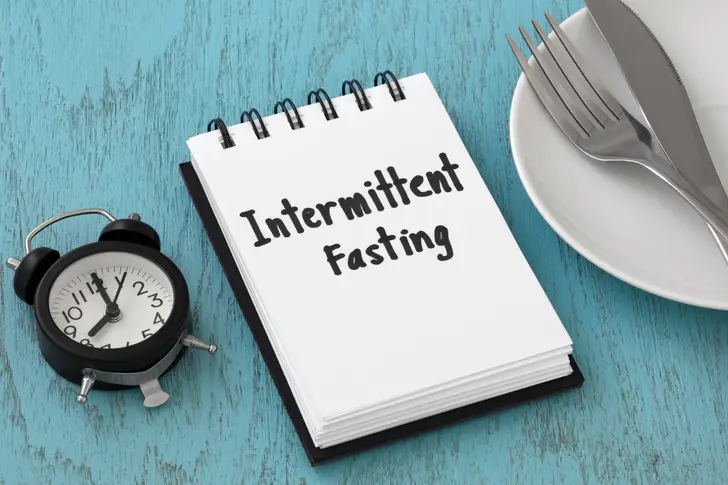Intermittent Fasting for Women Over 50


Intermittent Fasting for Women Over 50
Intermittent fasting has become popular among people over 50 because of its range of health benefits and the fact that unlike a diet, it doesn't restrict food choices. You don’t need to track calories, although you should avoid overeating on the days that you aren't fasting.

Age and Metabolism
Once you're over 50, losing weight can become harder – especially if you're a woman. The main reason is often a slowed metabolism, your body's process of turning the food that you eat into fuel. The more lean muscle you have, the faster your metabolism. But as you get older, you lose lean muscle. You might also be less active than when you were younger. The result is extra body fat.

What Is Intermittent Fasting?
Intermittent fasting is not a diet but a pattern of eating. Common ways to fast include the daily method (16/8, for example, in which you fast for 16 hours), the 5:2 method (fast for 2 days a week), the alternate day method, and the 24-hour method. Each approach has its own benefits and challenges.

How Does Intermittent Fasting Work?
During fasting, your body uses stored glucose (blood sugar) for energy and then begins to burn fat once glucose stores are depleted. This can help you lose weight and may improve your overall health. You still need to follow a healthy diet when you aren’t fasting.

Benefits of Intermittent Fasting
Research suggests intermittent fasting may improve your gut health, reduce inflammation, lower blood sugar levels, and boost your mood. More studies are needed, but early data indicate that IF could be a valuable tool for women over 50.

What Can You Drink While Fasting?
Make sure you stay hydrated when fasting. You can drink calorie-free beverages such as water, black coffee, and unsweetened tea. Avoid waiting until you're thirsty to drink, as thirst can be an early sign of dehydration, especially if you're over 65.

Intermittent Fasting Risks
While intermittent fasting appears safe in the short term, its long-term effects are less clear. Some studies suggest an increased risk of heart disease. Common side effects include headaches, fatigue, irritability, and digestive issues.

Who Shouldn’t Try Intermittent Fasting?
Intermittent fasting isn't for everyone. You shouldn't fast if you have a history of eating disorders or certain medical conditions. Talk to your doctor before starting a new eating plan.
Photo Credits:
Slide 1: iStock/Getty Images Plus
Slide 2: Johner Images Royalty-Free/Getty Images
Slide 3: E+/Getty Images
Slide 4: Moment/Getty Images
Slide 5: Moment/Getty Images
Slide 6: iStock/Getty Images Plus
Slide 7: E+/Getty Images
Slide 8: iStock/Getty Images Plus
Slide 9: iStock/Getty Images Plus
Slide 10: E+/Getty Images
Joanna Li, RD, nutritionist, Foodtrainers, New York.
Cleveland Clinic: “The Color of Pee,” “Intermittent Fasting: 4 Different Types Explained," "Dehydration," "Menopause."
Harvard Health Publishing: "Intermittent fasting: Surprising update," "Is intermittent fasting safe for older adults?" "4 intermittent fasting side effects to watch out for," "Understanding acute and chronic inflammation," "Should you try intermittent fasting for weight loss?"
Johns Hopkins Medicine: “Intermittent Fasting: What is it, and how does it work?” "Take your diet to the Mediterranean."
Journal of Mid-Life Health: “Role of therapeutic fasting in women’s health: An overview.”
Northwest Community Healthcare: “Why is it so hard for women over 50 to lose weight?”
The Johns Hopkins Patient Guide to Diabetes: "An Overview of Intermittent Fasting."
UC Davis: "Intermittent Fasting: Benefits, how it works, and is it right for you?" "Nutrition & Health Info Sheets for Health Professionals—Intermittent Fasting."
American Heart Association: "8-hour time restricted eating linked to a 91% higher risk of cardiovascular death."
Nutrients: "The Effects of Intermittent Fasting on Brain and Cognitive Function."
Harvard T. H. Chan School of Public Health: "Diet Review: Intermittent Fasting for Weight Loss."
The Lancet: "Intermittent fasting and health outcomes: an umbrella review of systematic reviews and meta-analyses of randomised controlled trials."
Nature Communications: "Gut microbiome remodeling and metabolomic profile improves in response to protein pacing with intermittent fasting versus continuous caloric restriction."
Aurora Health Care: “8 Metabolism Myths Debunked.”
Japanese Journal of Geriatrics: “Aging, basal metabolic rate, and nutrition.”
Journal of Medical Internet Research: “Effects of a Web-Based Intervention on Physical Activity and Metabolism in Older Adults: Randomized Controlled Trial.”
Mayo Clinic: “Is a slow metabolism the reason I’m overweight?”
NHS: “How can I speed up my metabolism?”
Salt Lake Regional Medical Center: “How Your Metabolism Changes as You Age."